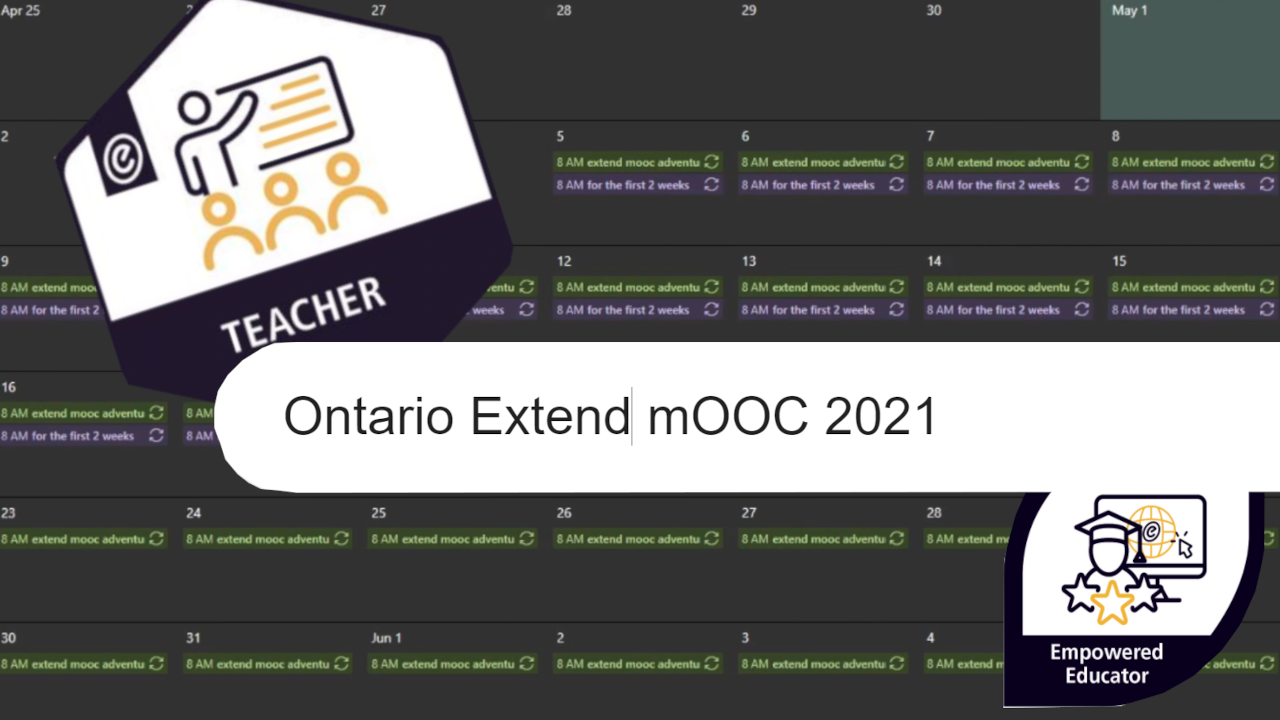The last you heard from us we were celebrating our achievements as we each received our Teacher for Learning Badges from eCampusOntario. WOOT WOOT!
In our 2nd episode of Extend Radio 2021, however, we may have cranked up the drama too much, making believe that we were worried that our work wasn’t good enough to achieve the badge. But it was all in the interest of radio drama. We knew we were good enough, just as we know you are more than good enough to be successful in the mOOC. And we can’t wait to get started with you in May!
So, with that being said, it is time for another update on the learny journey that we are on, as we continue to model the experience for you. If the analogy is that we’re trying to reach the summit of a big ol’ mountain, completing the teacher for learning module together was like reaching a spot to camp out. And this camp happens to have a helicopter pad that we’ve made use of as Kristine is flying off to climb other mountains, and Maureen and Katrina are flying in to continue up from here. Welcome to the team, Katrina and Maureen!
Oh and also we’re each going to head up the rest of the mountain taking a different route. From now on you’ll be seeing:
So without further ado, let’s see those reports!
Terry
The first step of the Technologist Module is to complete an unofficial Extend activity. It doesn’t count towards your badge, so if you live life on the edge, you could skip it. I for one live life with the edge in sight, but like not anywhere near it. That simple activity is to share your own definition of digital literacies. Here is what I came up with. It’s not heading to Oxford any time soon, but it works for me. Next up is what I consider one of the most important Extend activities of all, The Empathy Map. I should be able to get real input from my students on it, so I’m excited to see what they come up with!
Maureen
I imagine that I’ll soon expand my personal learning network (PLN) with a whole new crew of fellow travelers on this Extend journey, so I’m excited to be working through the Collaborator module. I decided to jump in with the first two activities, which the module directly suggests might be shared via Twitter – one of the greatest places around to grow your PLN. Here are my activity responses including their related Twitter links.
Christian
I took a swing at the first activity in the Curator Module, which asks us to find an openly licensed image and explain how the process unfolded while making use of different strategies and spaces. After having aced the h5p quizzes testing my understating of the Creative Commons and Boolean operators, I felt geared out, tooled up, and ready to give it my best. From mirrors and movies to artificial bouquets, sometimes you don’t know what you’re looking for until you find it. As per the continuation of our explicit understanding, you can read about the beginning of my new adventure at the link.
Stephanie
“All life is an experiment. The more experiments you make the better.”
-Ralph Waldo Emerson.
I have always loved that quote and am very excited to be jumping into the Experimenter Module. Not only does this module encourage you to try new tools and design with new approaches, but it also offers a lot of flexibility. For this module, you need to complete three activities from a list of ten options. Who doesn’t love having options?! I chose to use Padlet for my first activity as a way of gathering some reflections on the past year of teaching remotely. I included five different reflection prompts and would really love to hear from you on one or all five – Remote Teaching: A Year in Review!
Katrina
Learning how to bring my methodology from my research work into my teaching is an exciting step, and one I’m thrilled to be taking. Going through the thinking process and reflecting on what my motivations and methods are has been very important in this first activity. Here is what I got up to this week, in the interest of ‘showing my work’ – I began with expectations, and then you can see my notes as I went through each learning activity.
What’s Next?
Next week we’ll each be tackling some more activities in each of our modules. Don’t forget to add your name to the list if you’re interested in joining us in the spring. See you next week!







